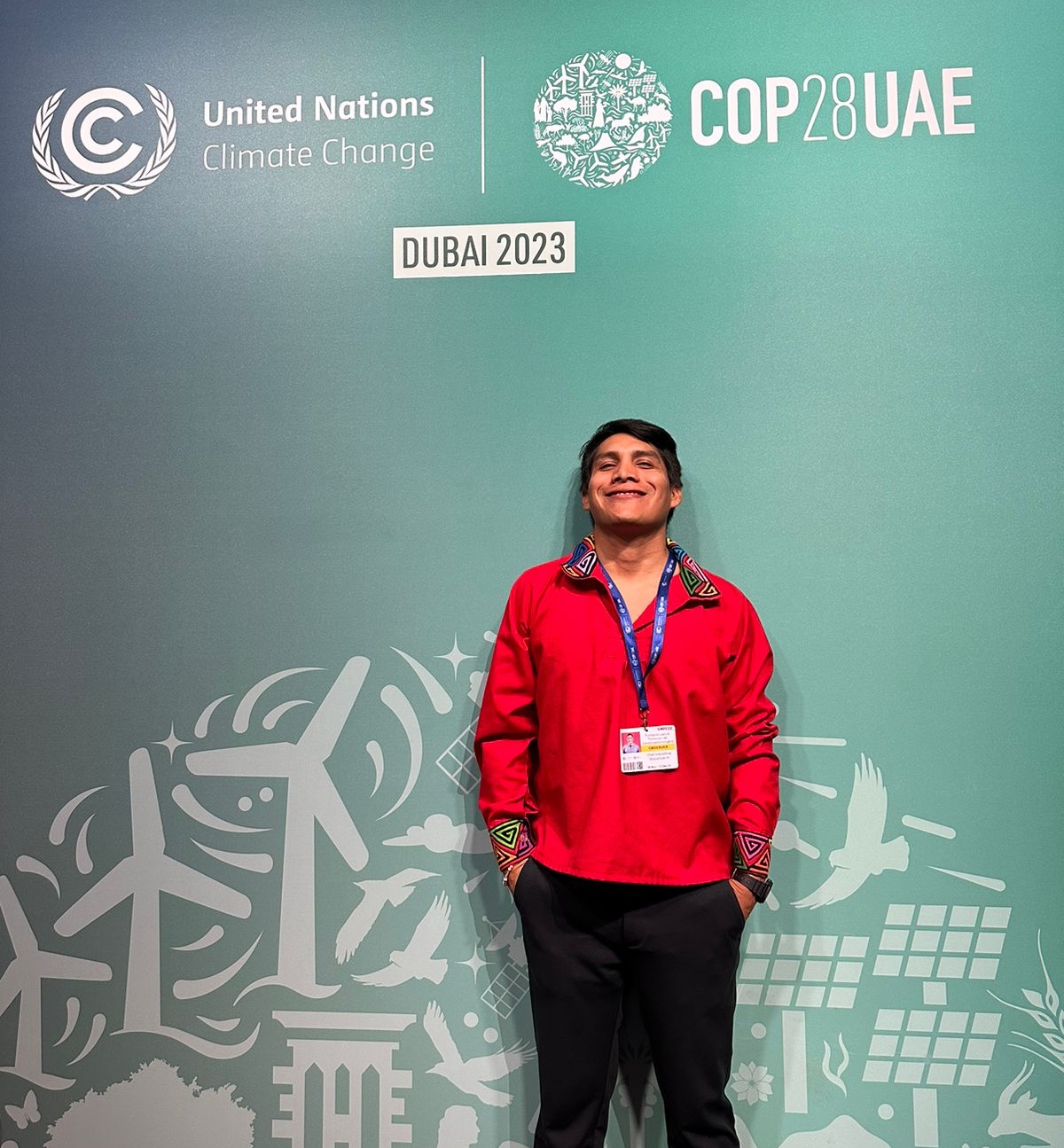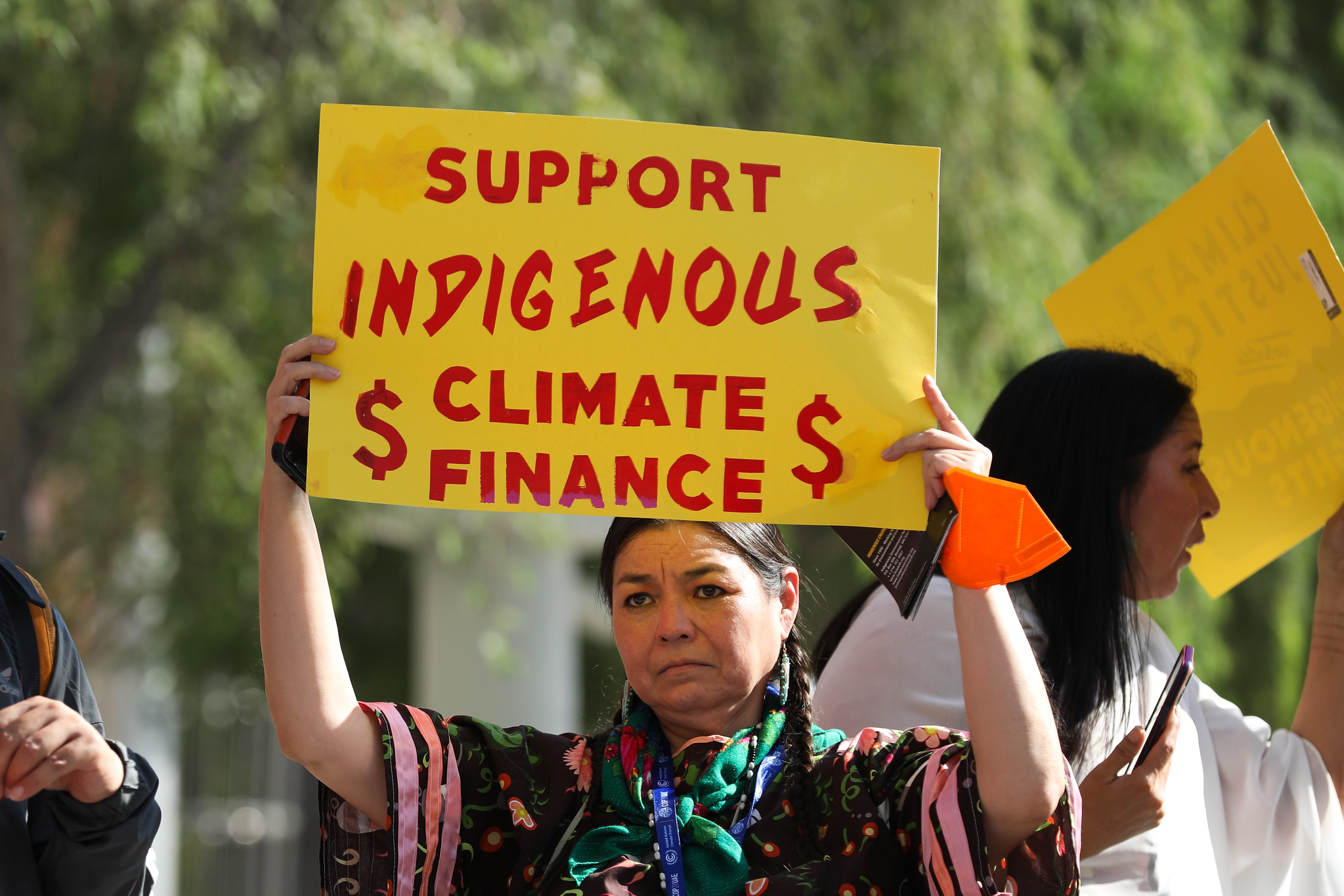2024-02-28
by Isabela Pérez
The United Nations’ Conference of the Parties (COP) is the biggest climate event hosted each year with the participation of states, non-governmental and civil society organisations, and delegates from across the world. Each year the conference has the challenging task of becoming the cradle of new global agreements to help the world reach climate goals and address the climate crisis.
As stated by Alexis Grefa, an indigenous youth leader from the Kichwa Santa Clara community in Ecuador, “It is impossible to address environmental struggles without including Indigenous Peoples and local communities [IP&LC] rights into the discussions.”
It is for this reason that COP conferences – including the one being held in Brazil in 2025 – are especially important for IP&LCs, offering the opportunity to be included in global decision-making and formal actions that can help ensure the protection of their rights and identities.
But how is it to truly navigate COP for IP&LC delegates? Is the conference really a space where they can advocate for their rights?
Building on their experience as delegates at COP28 in 2023 and previous conferences, various indigenous youth delegates described navigating COP as an intricate experience, where sentiments of hope, the will for change, disillusionment and frustration amalgamate. However, they mostly express the fact that navigating COP as an IP&LC delegate means an extra layer of obstacles to face.
For instance, they argue that beyond navigating the intrinsic complexities of the conference, IP&LC delegates also struggle for real inclusion at COP, as they have to fight for meaningful participation, dodge folklorisation and face entrenched privilege. Hence, COP becomes a somewhat arid space for IP&LC delegates and for the advocacy of their rights.
"We Indigenous Peoples are ... only being taken to COP for others to decide on important matters and for them to take our pictures."
Fighting for inclusion
The last COP took place in Dubai, United Araba Emirates. One of the main goals set by its presidency was to make the conference more inclusive. This led COP28 to host around 300 indigenous delegates, a record for the COP process.
Despite this important milestone, indigenous youth delegates describe their participation at COPs as still mostly superficial. As María José Cerda, indigenous youth leader of the Kichwa Serena community in Ecuador and leader of the economic and community development area of the Confederation of Indigenous Nationalities of the Ecuadorian Amazon (CONFENIAE) stated, “They are inviting us to participate in these spaces, but without real inclusion.”
This feeling is generated because of the conference’s inherent structure. IP&LC delegates mostly attend as civil society organisation delegates with limited or no real power in decision-making.
Thus, the indigenous youth delegates interviewed perceived IP&LC participation at COP as merely delivering speeches, which they feel are scarcely heard by important decision-takers; having their pictures taken; and having too little IP&LC presence in important negotiations. For them, attending COP means a constant fight against discrimination and for recognition and participation in decisive conference spaces.
“We Indigenous Peoples are not being granted the proper space at the conference. We are only being taken to COP for others to decide on important matters and for them to take our pictures,” said Alexis Grefa.

Onel Arias, an indigenous youth leader from Panama, says language can be a barrier at prominent international events like the UN climate conferences. (Photo provided by Onel Arias)
Layers of privilege
Indigenous youth delegates also describe other, more practical, challenges at COP. These include having to navigate between the disparities of access and power that weave the conference’s structure; specifically, when it comes to the conference’s language prioritisations and the financial toll of participating in COP.
COP provides accessibility in the six UN official languages: English, Arabic, Chinese, French, Russian and Spanish. Even though this already represents a significant accessibility step for a global event, it is sometimes not enough for IP&LC delegates. As described by Onel Arias, Guna indigenous youth leader and member of the Foundation for the Promotion of Indigenous Knowledge in Panama (FPCI), and María José Cerda, it is important to remember that English, the most used language at COP, and Spanish are not the first languages for many IP&LC delegates. Thus, negotiating, expressing themselves, and receiving information at the conference in these languages is sometimes complex.
“A big challenge that we face is the language barrier. The most commonly used language at the UN is English … but for many Indigenous Peoples … English is their third [language],” said Onel Arias. “Here we can see an obstacle for us that is innate to the system. Due to the language barrier, Indigenous Peoples cannot [adequately provide] input.”
The language barrier is not only an obstacle when participating at COP. It also can be a barrier for attendance at the conference. According to Onel and María José, many times IP&LC individuals who are well prepared and do crucial work on a territorial level do not attend COP as they do not speak the conference languages. This is important, as many voices, realities and ideas regarding IP&LC rights and identities may never reach the conference.
Moreover, it is important to recognise that the language barrier becomes even more challenging for Brazilian IP&LCs, as Portuguese, often their second language, is not an official conference language. This is specially concerning because Brazilian IP&LC participation at COP is vital, as they represent around 305 IP&LC groups, many of whom reside in and protect the Amazon Forest, a region that is vital for the world’s environmental health. Likewise, this issue is especially pressing as COP30 is scheduled to take place in the Amazon region, in the Brazilian city of Belém, in November 2025.
Indigenous youth delegates also highlight the financial burden of attending the conference. Each year COP rotates its location across the globe. This means that to attend COP, delegates, especially those not sponsored by or attached to organisations, must bear the costs of travel, accommodation and food on their own. As described by Onel, “many times [IP&LC representatives] want to attend, but can’t attend the conference, because basically there is not money.”
"COP30 will be an indigenous COP."
Looking ahead to Brazil
The experiences of indigenous youth delegates shed light on the need of dismantling the systemic barriers inherent in the conference to assure the adequate participation of IP&LCs as crucial stakeholders in climate matters and in COP. For this to occur, global reflections about the conference, as well as collaborative efforts aimed at improving it, are vital.
However, looking ahead to future COPs, indigenous youth delegates remain optimistic and hopeful. As Onel Arias notes, “With every difficulty we encounter, there is also always an opportunity, an opportunity to create solutions.”
For instance, they are trying to highlight the fact that the conference does have immense value for IP&LCs, and thus important outcomes have been achieved in these spaces.
They underlined the progress achieved at COP28 with the launch of the International Indigenous Youth Forum on Climate Change (IIFYCC). The forum that aims to ensure more adequate participation, opportunities for action, and capacity-strengthening platforms for IP&LC young people globally.
Secondly, they are optimistic about COP30 in Brazil. They are hopeful that IP&LCs will receive more opportunities to have impactful roles in the conference negotiations, outcomes, and structure. As María Jose Cerda stated, “COP30 will be an indigenous COP”.
And third, they are optimistic about themselves, about the work they and other IP&LC leaders and organisations are doing to create advocacy and opportunities for better representation, meaningful inclusion, and the dismantling of the obstacles they encounter at COP.

Indigenous representatives played an important role in pressing for more direct financing at COP28 in Dubai, but hope for an even higher profile at in 2025, when the UN climate conference is scheduled to take place in Brazil. (COP28/Kiara Worth)
Articles